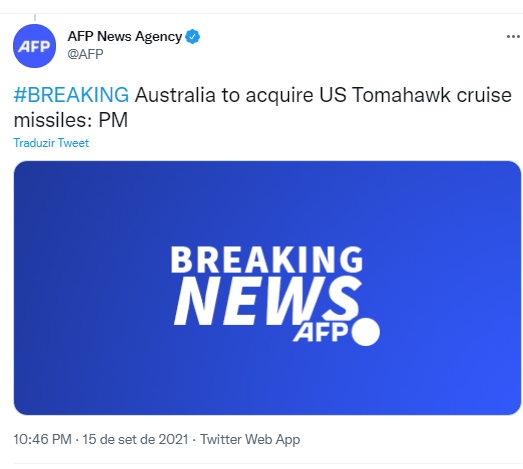
Marinha da Austrália
Moderador: Conselho de Moderação
- knigh7
- Sênior

- Mensagens: 18740
- Registrado em: Ter Nov 06, 2007 12:54 am
- Localização: S J do Rio Preto-SP
- Agradeceu: 1963 vezes
- Agradeceram: 2490 vezes
- knigh7
- Sênior

- Mensagens: 18740
- Registrado em: Ter Nov 06, 2007 12:54 am
- Localização: S J do Rio Preto-SP
- Agradeceu: 1963 vezes
- Agradeceram: 2490 vezes
Re: Marinha da Austrália
As notícias nos posts anteriores têm ligação com isto:

https://www.defesanet.com.br/pac/notici ... -do-AUKUS/

https://www.defesanet.com.br/pac/notici ... -do-AUKUS/
- P44
- Sênior

- Mensagens: 55288
- Registrado em: Ter Dez 07, 2004 6:34 am
- Localização: O raio que vos parta
- Agradeceu: 2759 vezes
- Agradeceram: 2438 vezes
Re: Marinha da Austrália
French Government, Naval Group React to Australia’s Decision to end Attack-class Submarine Program
Attack-class Program to enter System Functional Review on time as planned
Artist impression of the Attack-class submarine. Naval Group image.
French Government, Naval Group React To Australia’s Decision To End Attack-Class Submarine Program
Naval News Staff 16 Sep 2021
Following yesterday’s announcement that the Australian Government will no longer be proceeding with the Attack Class Submarine Program, France’s Foreign Ministry and Ministry of Defense issued the following statement:
France takes note of the decision just announced by the Australian government to stop the “Future Submarine Program” ocean-class submarine program and to launch cooperation with the United States on nuclear powered submarines.
It is a decision contrary to the letter and the spirit of the cooperation which prevailed between France and Australia, based on a relationship of political trust as on the development of an industrial and technological base of defense of very high level in Australia.
The American choice which leads to the removal of an ally and a European partner such as France from a structuring partnership with Australia, at a time when we are facing unprecedented challenges in the Indo-Pacific region, whether on our values or on respect for multilateralism based on the rule of law marks an absence of coherence that France can only observe and regret.
While the joint communication on the European strategy for cooperation in the Indo-Pacific region is being published today, France confirms its desire for very ambitious action in this region aimed at preserving the “freedom of sovereignty” of everyone. . The only European nation present in the Indo-Pacific with nearly two million of its nationals and more than 7,000 soldiers, France is a reliable partner which will continue to keep its commitments there, as it has always done.
The regrettable decision just announced on the FSP program only reinforces the need to raise the issue of European strategic autonomy loud and clear. There is no other credible way to defend our interests and values in the world, including the Indo-Pacific.
French shipbuilder Naval Group issued the following statement:
Naval Group takes note of the decision of the Australian authorities to acquire a fleet of nuclear submarines in collaboration with the United States and the United Kingdom.
The Commonwealth decided not to proceed with the next phase of the program. This is a major
disappointment for Naval Group, which was offering Australia a regionally superior conventional
submarine with exceptional performances. Naval Group was also offering Australia a sovereign
submarine capability making unrivalled commitments in terms of technology transfer, jobs and
local content.
For five years, Naval Group teams, both in France and in Australia, as well as our partners, have given their best and Naval Group has delivered on all its commitments.
The analysis of the consequences of this sovereign Australian decision will be conducted with the Commonwealth of Australia in the coming days.
https://www.navalnews.com/naval-news/20 ... e-program/
Attack-class Program to enter System Functional Review on time as planned
Artist impression of the Attack-class submarine. Naval Group image.
French Government, Naval Group React To Australia’s Decision To End Attack-Class Submarine Program
Naval News Staff 16 Sep 2021
Following yesterday’s announcement that the Australian Government will no longer be proceeding with the Attack Class Submarine Program, France’s Foreign Ministry and Ministry of Defense issued the following statement:
France takes note of the decision just announced by the Australian government to stop the “Future Submarine Program” ocean-class submarine program and to launch cooperation with the United States on nuclear powered submarines.
It is a decision contrary to the letter and the spirit of the cooperation which prevailed between France and Australia, based on a relationship of political trust as on the development of an industrial and technological base of defense of very high level in Australia.
The American choice which leads to the removal of an ally and a European partner such as France from a structuring partnership with Australia, at a time when we are facing unprecedented challenges in the Indo-Pacific region, whether on our values or on respect for multilateralism based on the rule of law marks an absence of coherence that France can only observe and regret.
While the joint communication on the European strategy for cooperation in the Indo-Pacific region is being published today, France confirms its desire for very ambitious action in this region aimed at preserving the “freedom of sovereignty” of everyone. . The only European nation present in the Indo-Pacific with nearly two million of its nationals and more than 7,000 soldiers, France is a reliable partner which will continue to keep its commitments there, as it has always done.
The regrettable decision just announced on the FSP program only reinforces the need to raise the issue of European strategic autonomy loud and clear. There is no other credible way to defend our interests and values in the world, including the Indo-Pacific.
French shipbuilder Naval Group issued the following statement:
Naval Group takes note of the decision of the Australian authorities to acquire a fleet of nuclear submarines in collaboration with the United States and the United Kingdom.
The Commonwealth decided not to proceed with the next phase of the program. This is a major
disappointment for Naval Group, which was offering Australia a regionally superior conventional
submarine with exceptional performances. Naval Group was also offering Australia a sovereign
submarine capability making unrivalled commitments in terms of technology transfer, jobs and
local content.
For five years, Naval Group teams, both in France and in Australia, as well as our partners, have given their best and Naval Group has delivered on all its commitments.
The analysis of the consequences of this sovereign Australian decision will be conducted with the Commonwealth of Australia in the coming days.
https://www.navalnews.com/naval-news/20 ... e-program/
Triste sina ter nascido português 
- knigh7
- Sênior

- Mensagens: 18740
- Registrado em: Ter Nov 06, 2007 12:54 am
- Localização: S J do Rio Preto-SP
- Agradeceu: 1963 vezes
- Agradeceram: 2490 vezes
- P44
- Sênior

- Mensagens: 55288
- Registrado em: Ter Dez 07, 2004 6:34 am
- Localização: O raio que vos parta
- Agradeceu: 2759 vezes
- Agradeceram: 2438 vezes
Re: Marinha da Austrália
https://www.reuters.com/world/asia-paci ... 021-09-15/
WASHINGTON/CANBERRA, Sept 16 (Reuters) - The United States, Britain and Australia announced a new security partnership for the Indo-Pacific in a move hailed by regional allies but denounced by China as intensifying an arms race in the region.
Under the partnership, announced by President Joe Biden, British Prime Minister Boris Johnson and Australian Prime Minister Scott Morrison, the United States and Britain will provide Australia with the technology and capability to deploy nuclear-powered submarines.
The United States and its allies are looking for ways to push back against China's growing power and influence, particularly its military buildup, pressure on Taiwan and deployments in the contested South China Sea.
The three western leaders did not mention China by name in Wednesday's announcement and senior Biden administration officials, who briefed reporters ahead of time, said the partnership was not aimed at countering Beijing.
However, Chinese foreign ministry spokesman Zhao Lijian said the trio were "severely damaging regional peace and stability, intensifying an arms race, and damaging international nuclear non-proliferation efforts".
Countries should not build partnerships that target third countries, he told a regular briefing in Beijing on Thursday.
"China will closely watch the situation's development."
In a three-way virtual announcement, the leaders stressed Australia will not be fielding nuclear weapons but using nuclear propulsion systems for the vessels, to guard against threats.
"We all recognize the imperative of ensuring peace and stability in the Indo-Pacific over the long term," said Biden.
"We need to be able to address both the current strategic environment in the region, and how it may evolve because the future of each of our nations and indeed the world depends on a free and open Indo-Pacific enduring and flourishing in the decades ahead," he said.
Morrison said the submarines would be built in the city of Adelaide and Australia would meet all of its nuclear non-proliferation obligations.
ADVANCED SYSTEMS
Johnson said the pact, dubbed AUKUS, was not meant to be adversarial towards anyone and it would reduce the costs of Britain's next generation of nuclear submarines.
"Now that we have created AUKUS we expect to accelerate the development of other advanced defence systems including in cyber, artificial intelligence, quantum computing and undersea capabilities," Johnson told parliament.
One U.S. official said the partnership was the result of months of engagements by military and political leaders during which Britain - which recently sent an aircraft carrier to Asia - had indicated it wanted to do more in the region.
New Zealand Prime Minister Jacinda Ardern welcomed the focus on the Indo-Pacific but said Australia's nuclear-powered submarines would not be allowed in its territorial waters under a long-standing nuclear-free policy.
Singapore said it had long had relations with Australia, Britain and the United States and hoped their grouping would contribute to peace and stability.
Japan said the three countries' strengthening of security and defence cooperation was important for peace and security.
A U.S. official briefing before the announcement said Biden had not mentioned the plans "in any specific terms" to Chinese leader Xi Jinping in a call last Thursday, but did "underscore our determination to play a strong role in the Indo-Pacific." read more
U.S. officials said nuclear propulsion would allow the Australian navy to operate more quietly, for longer periods, and provide deterrence across the Indo-Pacific.
'ANGRY AND BITTER'
The partnership ends Australia's 2016 deal with French shipbuilder Naval Group to build it a new submarine fleet worth $40 billion to replace its more than two-decades-old Collins submarines, a spokesperson for Morrison told Reuters. read more
France accused Biden of stabbing it in the back and acting like his predecessor Donald Trump.
"This brutal, unilateral and unpredictable decision reminds me a lot of what Mr Trump used to do," Foreign Minister Jean-Yves Le Drian told franceinfo radio. "I am angry and bitter. This isn't done between allies."
Naval Group said in a statement that Australia's decision was a major disappointment.
Biden said the three governments would launch an 18-month consultation period "to determine every element of this program, from workforce, to training requirements, to production timelines" and to ensure full compliance with non-proliferation commitments.
The pact should be a boon for the U.S. defense industry and among the firms that could benefit are General Dynamics Corp (GD.N) and Huntington Ingalls Industries Inc (HII.N).
General Dynamics' Electric Boat business does much of the design work for U.S. submarines, but critical subsystems such as electronics and nuclear power plants are made by BWX Technologies Inc (BWXT.N)
U.S. officials did not give a time frame for when Australia would deploy a nuclear-powered submarine, or how many would be built. They said that since Australia does not have any nuclear infrastructure, it would require a sustained effort over years.
A U.S. official said Washington had shared nuclear propulsion technology only once before - with Britain in 1958 - and added: "This is frankly an exception to our policy in many respects, I do not anticipate that this will be undertaken in other circumstances ... We view this as a one-off."
WASHINGTON/CANBERRA, Sept 16 (Reuters) - The United States, Britain and Australia announced a new security partnership for the Indo-Pacific in a move hailed by regional allies but denounced by China as intensifying an arms race in the region.
Under the partnership, announced by President Joe Biden, British Prime Minister Boris Johnson and Australian Prime Minister Scott Morrison, the United States and Britain will provide Australia with the technology and capability to deploy nuclear-powered submarines.
The United States and its allies are looking for ways to push back against China's growing power and influence, particularly its military buildup, pressure on Taiwan and deployments in the contested South China Sea.
The three western leaders did not mention China by name in Wednesday's announcement and senior Biden administration officials, who briefed reporters ahead of time, said the partnership was not aimed at countering Beijing.
However, Chinese foreign ministry spokesman Zhao Lijian said the trio were "severely damaging regional peace and stability, intensifying an arms race, and damaging international nuclear non-proliferation efforts".
Countries should not build partnerships that target third countries, he told a regular briefing in Beijing on Thursday.
"China will closely watch the situation's development."
In a three-way virtual announcement, the leaders stressed Australia will not be fielding nuclear weapons but using nuclear propulsion systems for the vessels, to guard against threats.
"We all recognize the imperative of ensuring peace and stability in the Indo-Pacific over the long term," said Biden.
"We need to be able to address both the current strategic environment in the region, and how it may evolve because the future of each of our nations and indeed the world depends on a free and open Indo-Pacific enduring and flourishing in the decades ahead," he said.
Morrison said the submarines would be built in the city of Adelaide and Australia would meet all of its nuclear non-proliferation obligations.
ADVANCED SYSTEMS
Johnson said the pact, dubbed AUKUS, was not meant to be adversarial towards anyone and it would reduce the costs of Britain's next generation of nuclear submarines.
"Now that we have created AUKUS we expect to accelerate the development of other advanced defence systems including in cyber, artificial intelligence, quantum computing and undersea capabilities," Johnson told parliament.
One U.S. official said the partnership was the result of months of engagements by military and political leaders during which Britain - which recently sent an aircraft carrier to Asia - had indicated it wanted to do more in the region.
New Zealand Prime Minister Jacinda Ardern welcomed the focus on the Indo-Pacific but said Australia's nuclear-powered submarines would not be allowed in its territorial waters under a long-standing nuclear-free policy.
Singapore said it had long had relations with Australia, Britain and the United States and hoped their grouping would contribute to peace and stability.
Japan said the three countries' strengthening of security and defence cooperation was important for peace and security.
A U.S. official briefing before the announcement said Biden had not mentioned the plans "in any specific terms" to Chinese leader Xi Jinping in a call last Thursday, but did "underscore our determination to play a strong role in the Indo-Pacific." read more
U.S. officials said nuclear propulsion would allow the Australian navy to operate more quietly, for longer periods, and provide deterrence across the Indo-Pacific.
'ANGRY AND BITTER'
The partnership ends Australia's 2016 deal with French shipbuilder Naval Group to build it a new submarine fleet worth $40 billion to replace its more than two-decades-old Collins submarines, a spokesperson for Morrison told Reuters. read more
France accused Biden of stabbing it in the back and acting like his predecessor Donald Trump.
"This brutal, unilateral and unpredictable decision reminds me a lot of what Mr Trump used to do," Foreign Minister Jean-Yves Le Drian told franceinfo radio. "I am angry and bitter. This isn't done between allies."
Naval Group said in a statement that Australia's decision was a major disappointment.
Biden said the three governments would launch an 18-month consultation period "to determine every element of this program, from workforce, to training requirements, to production timelines" and to ensure full compliance with non-proliferation commitments.
The pact should be a boon for the U.S. defense industry and among the firms that could benefit are General Dynamics Corp (GD.N) and Huntington Ingalls Industries Inc (HII.N).
General Dynamics' Electric Boat business does much of the design work for U.S. submarines, but critical subsystems such as electronics and nuclear power plants are made by BWX Technologies Inc (BWXT.N)
U.S. officials did not give a time frame for when Australia would deploy a nuclear-powered submarine, or how many would be built. They said that since Australia does not have any nuclear infrastructure, it would require a sustained effort over years.
A U.S. official said Washington had shared nuclear propulsion technology only once before - with Britain in 1958 - and added: "This is frankly an exception to our policy in many respects, I do not anticipate that this will be undertaken in other circumstances ... We view this as a one-off."
Triste sina ter nascido português 
- FIGHTERCOM
- Sênior

- Mensagens: 4976
- Registrado em: Sex Ago 04, 2006 6:51 pm
- Agradeceu: 1189 vezes
- Agradeceram: 721 vezes
Re: Marinha da Austrália
Que sigla difícil de pronunciar... AUKUS?!knigh7 escreveu: ↑Qua Set 15, 2021 11:38 pm As notícias nos posts anteriores têm ligação com isto:
https://www.defesanet.com.br/pac/notici ... -do-AUKUS/
Vejamos...
UKUSA, USUKA... estilo anime japonês,
Mas para mim nada supera:
UKAUS... remete ao Afeganistão.
Abraços,
Wesley
"A medida que a complexidade aumenta, as declarações precisas perdem relevância e as declarações relevantes perdem precisão." Lofti Zadeh
- J.Ricardo
- Sênior

- Mensagens: 7612
- Registrado em: Qui Jan 13, 2005 1:44 pm
- Agradeceu: 2562 vezes
- Agradeceram: 1036 vezes
Re: Marinha da Austrália
De certa forma, esse tipo de acordo não fere o tratado de não proliferação nuclear?
Não temais ímpias falanges,
Que apresentam face hostil,
Vossos peitos, vossos braços,
São muralhas do Brasil!
Que apresentam face hostil,
Vossos peitos, vossos braços,
São muralhas do Brasil!
- knigh7
- Sênior

- Mensagens: 18740
- Registrado em: Ter Nov 06, 2007 12:54 am
- Localização: S J do Rio Preto-SP
- Agradeceu: 1963 vezes
- Agradeceram: 2490 vezes
Re: Marinha da Austrália
Remete à França. Perderam um negócio de USD 40 bi. É AUKUS dos franceses.FIGHTERCOM escreveu: ↑Qui Set 16, 2021 9:22 amQue sigla difícil de pronunciar... AUKUS?!knigh7 escreveu: ↑Qua Set 15, 2021 11:38 pm As notícias nos posts anteriores têm ligação com isto:
https://www.defesanet.com.br/pac/notici ... -do-AUKUS/
Vejamos...
UKUSA, USUKA... estilo anime japonês,
Mas para mim nada supera:
UKAUS... remete ao Afeganistão.
Abraços,
Wesley
- FIGHTERCOM
- Sênior

- Mensagens: 4976
- Registrado em: Sex Ago 04, 2006 6:51 pm
- Agradeceu: 1189 vezes
- Agradeceram: 721 vezes
Re: Marinha da Austrália
knigh7 escreveu: ↑Qui Set 16, 2021 12:18 pmRemete à França. Perderam um negócio de USD 40 bi. É AUKUS dos franceses.FIGHTERCOM escreveu: ↑Qui Set 16, 2021 9:22 am
Que sigla difícil de pronunciar... AUKUS?!
Vejamos...
UKUSA, USUKA... estilo anime japonês,
Mas para mim nada supera:
UKAUS... remete ao Afeganistão.
Abraços,
Wesley
"A medida que a complexidade aumenta, as declarações precisas perdem relevância e as declarações relevantes perdem precisão." Lofti Zadeh
- P44
- Sênior

- Mensagens: 55288
- Registrado em: Ter Dez 07, 2004 6:34 am
- Localização: O raio que vos parta
- Agradeceu: 2759 vezes
- Agradeceram: 2438 vezes
- knigh7
- Sênior

- Mensagens: 18740
- Registrado em: Ter Nov 06, 2007 12:54 am
- Localização: S J do Rio Preto-SP
- Agradeceu: 1963 vezes
- Agradeceram: 2490 vezes
Re: Marinha da Austrália
Segue o link do tratado.
https://www.un.org/disarmament/wmd/nuclear/npt/text
A transferência de tecnologia é para a propulsão nuclear. Não auxilia a fazer uma arma nuclear (no tratado "nuclear weapons").
Portanto não fere o acordo.
- Frederico Vitor
- Sênior

- Mensagens: 2064
- Registrado em: Ter Ago 14, 2007 1:34 pm
- Localização: Goiás
- Agradeceu: 206 vezes
- Agradeceram: 270 vezes
Re: Marinha da Austrália
Interessante notar que visitei alguns sites internacionais e não encontrei nenhuma referência ao Brasil em seu esforço de construir um SSN-K.
Diferentemente do futuro 'sub nuc' dos "ausses", o reator do Alvaro Alberto é integralmente nativo.
Enquanto à França, essa só cabe chorar. Uma retaliação interessante seria ceder à Indonésia (após acertar inicialmente a venda de Skorpenes) algum grau de transferência de tecnologia para a construção de um reator nuclear e incentivá-la a ter um submarino nuclear próprio, ao lado da Austrália, e com a desculpa de estar se defendendo da China.
Diferentemente do futuro 'sub nuc' dos "ausses", o reator do Alvaro Alberto é integralmente nativo.
Enquanto à França, essa só cabe chorar. Uma retaliação interessante seria ceder à Indonésia (após acertar inicialmente a venda de Skorpenes) algum grau de transferência de tecnologia para a construção de um reator nuclear e incentivá-la a ter um submarino nuclear próprio, ao lado da Austrália, e com a desculpa de estar se defendendo da China.
Editado pela última vez por Frederico Vitor em Sex Set 17, 2021 6:58 am, em um total de 1 vez.
- P44
- Sênior

- Mensagens: 55288
- Registrado em: Ter Dez 07, 2004 6:34 am
- Localização: O raio que vos parta
- Agradeceu: 2759 vezes
- Agradeceram: 2438 vezes
- knigh7
- Sênior

- Mensagens: 18740
- Registrado em: Ter Nov 06, 2007 12:54 am
- Localização: S J do Rio Preto-SP
- Agradeceu: 1963 vezes
- Agradeceram: 2490 vezes
Re: Marinha da Austrália
notícia de 2020( essa informação do Senado australiano foi repercutida em vários jornais da época)*

https://www.theage.com.au/politics/fede ... 564ea.html
90 AUD= 65 USD. Ou seja, um negócio de 65 bilhões de dólares. E isso bate com informação de € 56 bi (55,7) que alguns jornais reportam
*https://www.google.com.br/search?q=aust ... CAc&uact=5
Encontrei a informação no site do Parlamento da Australia:
https://www.aph.gov.au/About_Parliament ... Submarines

https://www.theage.com.au/politics/fede ... 564ea.html
90 AUD= 65 USD. Ou seja, um negócio de 65 bilhões de dólares. E isso bate com informação de € 56 bi (55,7) que alguns jornais reportam
*https://www.google.com.br/search?q=aust ... CAc&uact=5
Encontrei a informação no site do Parlamento da Australia:
https://www.aph.gov.au/About_Parliament ... Submarines
- knigh7
- Sênior

- Mensagens: 18740
- Registrado em: Ter Nov 06, 2007 12:54 am
- Localização: S J do Rio Preto-SP
- Agradeceu: 1963 vezes
- Agradeceram: 2490 vezes
Re: Marinha da Austrália
Humm...
Como foi feito o acordo entre a Austrália, Reino Unido e EUA para o compartilhamento da tecnologia de submarinos nucleares
The Times: ‘Como uma cena de Le Carré’: como o pacto do submarino nuclear foi o maior segredo do número 10 da Downing Street
Por Larisa Brown, Defence Editor
https://www.naval.com.br/blog/2021/09/1 ... nucleares/
Como foi feito o acordo entre a Austrália, Reino Unido e EUA para o compartilhamento da tecnologia de submarinos nucleares
The Times: ‘Como uma cena de Le Carré’: como o pacto do submarino nuclear foi o maior segredo do número 10 da Downing Street
Por Larisa Brown, Defence Editor
https://www.naval.com.br/blog/2021/09/1 ... nucleares/




